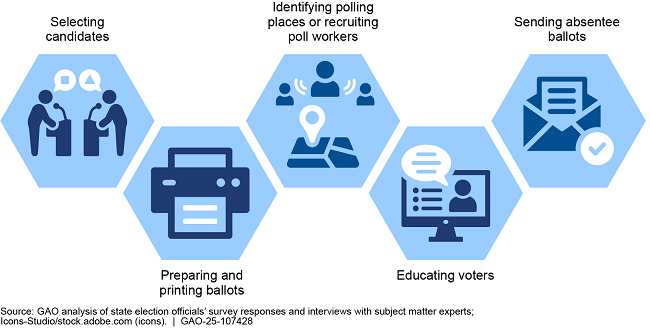The U.S. Constitution requires each state’s governor to issue written orders for special elections to fill vacancies in the U.S. House of Representatives (House). Following the terrorist attacks on September 11, 2001, a federal law was enacted in 2005 that generally requires states to hold special elections within 49 days of the Speaker of the House announcing that there are more than 100 vacancies in the House. Under the statute, this is referred to as “extraordinary circumstances.”
While almost all states have laws for holding special elections to fill House vacancies in general, GAO identified nine states that have laws for holding such elections in extraordinary circumstances, consistent with the federal law. The laws in these states adopt aspects of the federal law, including those related to the 49-day time frame, although most of them do not adopt all the law’s requirements. The other 41 states do not have laws that adopt aspects of the federal law, and their laws for holding special elections to fill House vacancies vary in the types of timing provisions they contain. Examples of the timing provisions for holding such elections include specifying the number of days within which states are required to hold the election or giving the governor discretion to order an election within a specific time frame. In the case of extraordinary circumstances, states must follow the provisions of the federal law regardless of whether their laws adopt aspects of that law.
GAO surveyed state election officials in all 50 states to obtain their perspectives on holding special elections consistent with the federal law. Nineteen of the 33 officials who responded reported that they were not aware of the federal law prior to hearing about GAO’s study. In addition, officials identified a range of challenges related to holding special elections consistent with the federal law. For example, officials reported that selecting candidates through primary elections in time to hold a special election within the 49-day time frame in the law would be difficult.
Examples of Challenges that States Might Face in Holding Special Elections in Extraordinary Circumstances

State election officials reported that the challenges they identified could affect the accuracy and availability of ballots, pamphlets, and other voting materials; public perceptions of the election; and voting access, such as whether voters have sufficient time to request absentee ballots. However, a number of officials noted that they believed they could hold special elections consistent with the federal law. Additionally, officials identified state practices that might help them hold such elections. For example, officials reported that in some cases states assign responsibility for candidate selection to political parties and noted that this could be done relatively quickly under a special election…